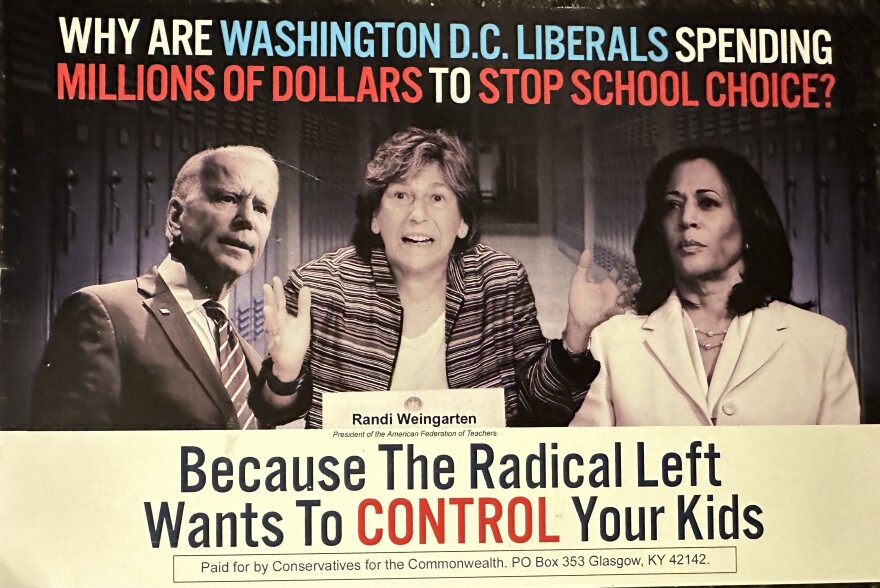Some Ballard County residents received a mailer titled "Just Look What Your Tax Dollars Bought for Ballard County Public Schools” that quoted sexually explicit passages from a trio of books the group deemed obscene.
A social media post made by the district Wednesday said that the books had been removed from the high school library’s shelves in reaction to the mailer. In a subsequent interview, Ballard County Schools superintendent Casey Allen confirmed that the decision was a direct reaction to the controversial postcard.

“The explicit language that was printed on the card and sent to homes not by us, to me, was enough information that I needed to pull those from the shelves, at least for now,” Allen said. “I know that some people will act shocked … but I don't know every book that's in the two libraries that we have, and I didn't know that these books were in there. However, no one in the two days since that mailer went out has challenged the books.”
A bill passed in 2022 – sponsored by Republican state Sen. Jason Howell of Murray – mandated that school districts have a process in place when it comes to material challenges. It also defined what sort of material can be classified as “harmful to minors.” That bill passed into law without Democratic Gov. Andy Beshear’s signature.
Ballard County Schools had a procedure for challenges more than five years before that law went into effect. Allen said only one item has been challenged since it was put in place, and that it was removed from the school’s library.
The works cited on the card included Susan Kuklin’s “Beyond Magenta,” a collection of interviews with teens on transgender identity; the young adult mystery “Shine,” a novel by Lauren Myracle that follows a teenage girl investigating a hate crime involving the beating and near-death of her LGBTQ friend; and Alice Sebold’s memoir “Lucky,” in which the author describes being sexually assaulted as a teen.
All three have been the focus of challenges to materials in libraries across the country since their publications. Kuklin penned an essay that was shared on NPR in 2022 about her work and challenges to it. She said then that people taking passages out of context is mostly what’s led to her book’s controversial reputation.

“So what they do is they'll pick a paragraph from the story, whether it's bad language — because kids curse — or whether it's a story of someone's life,” she told NPR. “They take it out of context, and then they turn — they complain about that, that the whole book should be banned and everything that's in it because of a paragraph here or a word there … people took [one] chapter and that story and turned it around into something very negative and very ugly.”
The district’s post indicated all three of the books it removed had been in the library since at least 2016, with the oldest of the three works having been on the school library’s shelf for more than two decades. It also indicated that none of the three books had been checked out recently.
Allen, a former English teacher, added that students “need to be exposed to information on all sides” and said – though it was “shocking to see … printed on a card and sent directly to people's homes” – that it’s important to consider the context of the language being quoted on the mailer.
“It's still shocking language, but a book that is written by [someone who’s] a victim of rape when she was 18 years old, you might expect to have shocking language,” the superintendent said. “So to pull an excerpt from that, print it on a card and send it to someone's home without explaining why someone was using language like that strikes me as being a little bit misleading, or at least disingenuous.”
The mailers were sent by Conservatives for the Commonwealth, a social welfare group with a mailing address in southcentral Kentucky. It urged people to “support school choice.” Kentuckians will vote on Amendment 2 in November, a ballot measure that would allow public funds to go toward private education.
Allen has been a vocal opponent of the ballot measure. He believes that it will drain resources from rural school districts like Ballard County.
“It just feels like a fight constantly to keep what we’ve got,” Allen said in an August interview. “But it’s a fight worth fighting.”
WPSD Local 6 obtained a statement from Conservatives for the Commonwealth earlier this week about the mailer and its purpose. In it, the group called the materials in question “pornographic.”
"We wanted to make sure citizens know that even in many rural communities, public schools are not immune to ideological and inappropriate materials in classrooms and schools,” it read. “These books were paid for with taxpayer dollars. These same school districts are telling their citizens to oppose school choice, while their children are subjected to outrageously sexual content in their own schools."
Copyright 2024 WKMS






